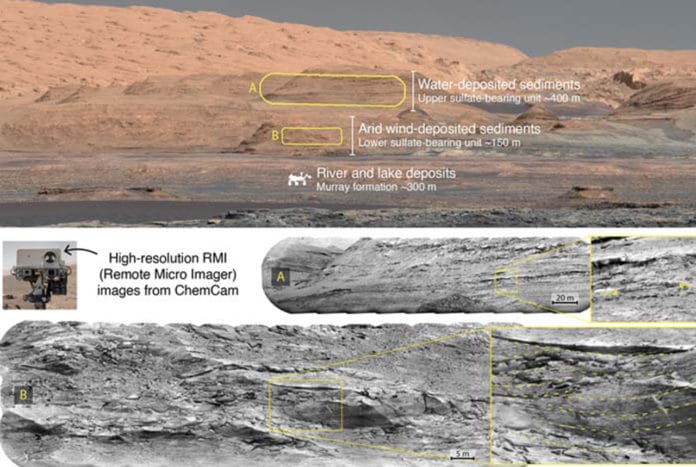Geological evidence suggests that rivers and oceans may have been prominent features of Mars’s early history. The Red planet is smaller than the earth, with less gravity and a thinner atmosphere. The theory suggests that over time, as liquid water evaporated, more and more of it escaped into space.
A new study based on data from NASA‘s Curiosity Mars rover, which continues to explore Mount Sharp’s base on the Red Planet, suggests that Mars had drier and wetter eras before drying up entirely about 3 billion years ago.
Using the long-range camera on ChemCam, the rock-vaporizing laser that sits on the mast of the Curiosity rover, scientists observed the steep terrain of Mount Sharp. Their observations suggest that the Martian climate alternated between dry and wetter periods before it went completely dry.
Roger Wiens, a coauthor on the paper and scientist at Los Alamos National Laboratory, said, “A primary goal of the Curiosity mission was to study the transition between the habitable environment of the past to the dry and cold climate Mars has now. These rock layers recorded that change in great detail.”
While moving up through the terrain, Climbing through the terrain, Curiosity detected drastic cane in the types of bed change. Located above the lake-deposited clays that form Mount Sharp’s base, sandstone layers show structures demonstrating their formation from wind-formed dunes, suggesting long, dry climate episodes. Higher up still, thin alternating brittle and resistant beds are typical of river-floodplain deposits, marking the wetter conditions’ return.
These terrain changes indicate that Mars’s climate underwent several changes: large-scale fluctuations between wetter and dryer periods until the generally arid conditions observed today took hold.
Journal Reference:
- W. Rapin et al, Alternating wet and dry depositional environments recorded in the stratigraphy of Mount Sharp at Gale crater, Mars, Geology (2021). DOI: 10.1130/G48519.1
